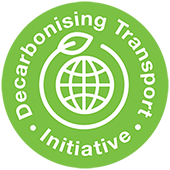Transport Decarbonisation: Driving Implementation
The project “Transport Decarbonisation: Driving Implementation”, known for short as "DT Implement", will help identify ways to cut CO₂ emissions in three hard-to-decarbonise areas of transport: aviation, shipping and heavy-duty road freight. Their successful transition to a low- and ultimately zero-carbon operation is vital to achieve the international community’s climate goals.
Aviation, maritime shipping and heavy-duty road freight are extremely fossil-fuel dependent. If aviation were a country, it would have been the 6th largest CO₂ direct emitter in 2019, behind Japan and ahead of Germany. Heavy-duty road vehicles account for 73% of greenhouse gas emissions (GHGs) from freight transport. The shipping sector contributes 3% of global energy-related CO₂ emissions due to its sheer size.
The transport sector remains directly dependent on oil for 92% of its energy end-use, which is incompatible with GHG reduction aims. ITF modelling scenarios show that current policy actions and plans to decarbonise transport are insufficient to meet international CO₂ reduction targets, despite the importance of the transport sector to achieve climate goals.
Decarbonising the three areas will require different approaches than those available for other transport modes. Unlike urban demand management, or electrifying household cars, the hard-to-abate sectors face more significant challenges to achieving a cost-effective transition. There is debate over which emission-reduction technologies to pursue for these modes, and some are not yet ready for implementation. Policy support and international co-operation to decarbonise these modes effectively is therefore crucial for success.
The work for this project is carried out in three Common Interest Groups. These are country-led stakeholder fora focusing on one mode of transport each. The Common Interest Groups bring together experts from governments, industry, the research community and NGOs. Their peer-to-peer exchange will help to identify areas of agreement and where further work needs to be done. The aim is to identify common priorities in research and innovation that will support the decarbonisation of aviation, shipping or heavy-duty road freight, and to facilitate the deployment and commercialization of relevant solutions. Common Interest Groups are open to ITF member countries, other invited countries, industry and major transport stakeholders. Currently, 31 countries take part in the three Common Interest Groups.
The project “Transport Decarbonisation: Driving Implementation” is part of the ITF’s wider Decarbonising Transport initiative. It is funded by the European Commission.

